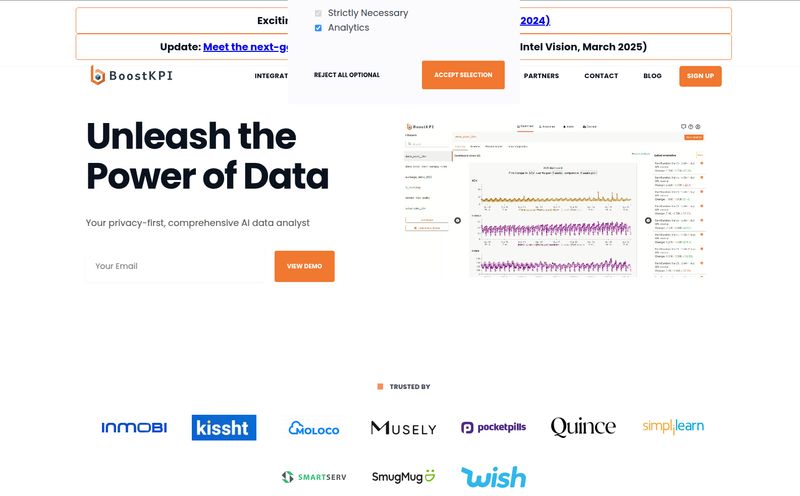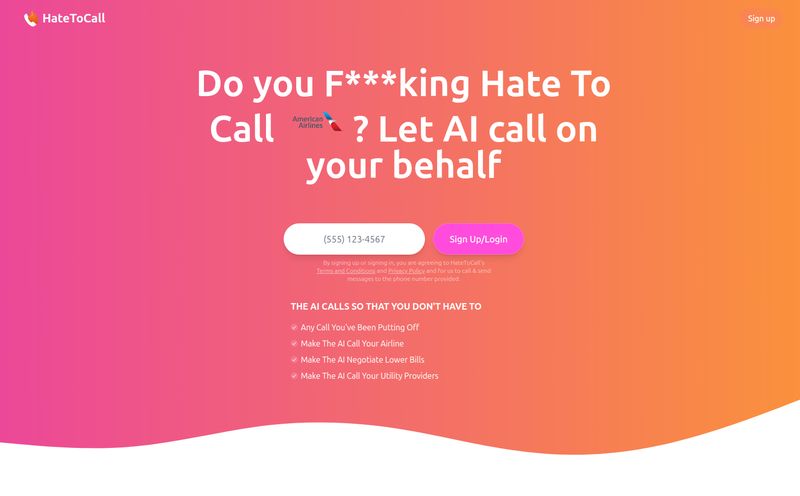If you’re in the SEO game, or any digital-first career, your brain probably has about a million tabs open at all times. Keyword research, SERP analysis, client emails, the latest Google algorithm rumor... it's a lot. My own mental bandwidth feels stretched thinner than a bad backlink profile most days. So when the trend of AI for wellness and mental health started popping up on my feeds, my curiosity was definitely piqued.
I've seen it all, from meditation apps that track your breathing to AI life coaches. Most of them feel a bit… gimmicky. But then I stumbled across something a little different: MindMateGPT, which presents itself as an AI therapist app. In the actual chat interface, it calls itself "Mindy 4.0," a journaling pal. An AI journaling pal? The idea felt both deeply futuristic and a little strange. Could a string of code really offer something meaningful for mental clarity? I had to find out.
What Exactly is MindMateGPT? (And Who is Mindy?)
So, here's the lowdown. MindMateGPT isn't just another generic chatbot. It's a specialized AI, developed by the folks at aitherapyresearch.ca, designed specifically to be a companion for your mental health. The persona you interact with is named Mindy, and her goal is to provide a confidential, empathetic space for you to offload your thoughts. Think of it less as a clinical session and more like an interactive journal that talks back, offers suggestions, and is available literally anytime you need it.

Visit MindMateGPT
The biggest headline? It’s free. In a world where therapy can be prohibitively expensive and waitlists are miles long, offering a tool like this at no cost is a pretty bold move. It aims to put a first step towards mental wellness within everyone's reach. No appointments, no insurance hurdles, just a browser window and a willingness to type.
My First Impressions: Firing Up the Chat
Logging on, I was met with a super simple, clean interface. No bells and whistles, which I appreciate. It felt less like booting up complex software and more like sending a text to a friend who’s always, always awake. I started with something simple, just venting about a stressful project and the classic feeling of imposter syndrome that creeps in.
I expected a generic, “I’m sorry to hear that.” Instead, the response was surprisingly nuanced. Mindy asked follow-up questions that showed it was... well, 'listening'. It picked up on the specific pressures I mentioned and reflected them back to me. There was a moment where it felt eerily human. Of course, I know it's a large language model pulling from mountains of data, but for a second, the illusion was pretty convincing.
The Core Features That Actually Matter
After a few days of chatting, I got a better feel for its capabilities. It's more than just a sympathetic ear.
Personalized Mental Health Support
One thing that stood out was its memory. Mindy seemed to remember details from our previous conversations. If I mentioned feeling anxious about a presentation on Monday, it might ask me how it went on Wednesday. This continuity makes the experience feel much more personal and less like starting from scratch every single time. It builds a thread of conversation that mimics a real relationship.
Effective Coping Strategies
This isn't just a place to vent; it's a place to get suggestions. When I talked about feeling overwhelmed by my to-do list, it didn't just say 'take a break.' It introduced me to a technique called the 'Eisenhower Matrix' to prioritize tasks. Another time, it suggested a simple grounding exercise when I mentioned feeling scatter-brained. These are actionable, concrete strategies that you can actually apply. It’s like having a little coach in your pocket, offering up plays from a well-established mental wellness playbook.
The Power of 24/7 Accessibility
This, for me, is the biggest selling point. That 3 AM wave of anxiety? The sudden burst of frustration after a late-night work session? Human therapists are asleep. Your friends are asleep. But Mindy is there. Having an instant, non-judgmental outlet to process those feelings in the moment is incredibly powerful. It prevents those thoughts from spiraling, which is something I think we can all relate too.
The Good, The Bad, and The AI
No tool is perfect, especially not in this emerging space. It’s important to look at both sides of the coin.
The Upside of AI Companionship
The accessibility is a game-changer. The fact that MindMateGPT is free removes one of the single biggest barriers to mental health support. For someone who is curious about therapy but not ready to commit, or can't afford it, this is an amazing entry point. The confidentiality also encourages a level of honesty that can be hard to achieve face-to-face. There's zero fear of judgment, which can lead to more open self-reflection.
Some Important Caveats
Now for the big, flashing disclaimer: This is not a replacement for a professional, licensed human therapist. I can't stress this enough. MindMateGPT is a fantastic supplement, a tool, a 'journaling pal' as it calls itself. It's a great support for day-to-day stress and self-exploration. But for serious mental health conditions, trauma, or crisis situations, you need a human expert. Period.
Furthermore, relying on AI just isn't for everyone. For some, the lack of genuine shared experience and human connection will always be a barrier. Sometimes you need someone who can say "I've been there" and truly mean it. An AI can simulate empathy, but it can't feel it. And for some people, that distinction matters most.
Who is MindMateGPT Actually For?
I see this tool being incredibly useful for a few specific groups. It's perfect for the busy professional who needs a quick, private way to decompress. It's great for students juggling academic and social pressures. I also think it's a valuable resource for anyone who uses journaling for mental clarity and wants a more interactive, dynamic experience. If you're on a long waitlist to see a therapist, Mindy could be a helpful bridge to keep you engaged with your mental well-being in the meantime.
Who isn't it for? Anyone in an acute crisis. In those moments, you need immediate human intervention, and you should be reaching out to a crisis hotline or a healthcare professional.
Frequently Asked Questions about MindMateGPT
- Is MindMateGPT really free to use?
- Yes, based on all the available information, the platform is free to use. This is one of its most significant advantages, making it highly accessible.
- How is my data used? Is it confidential?
- The platform emphasizes confidentiality. As with any AI tool, it's wise to assume that anonymized data might be used to train and improve the model. However, these interactions are designed to be private and not linked to your personal identity in the way a social media profile is. Always review the privacy policy of any service you use.
- Can Mindy diagnose mental health conditions?
- Absolutely not. Mindy is a support tool and a journaling pal, not a medical professional. It cannot and should not be used for diagnosis or as a substitute for professional medical advice.
- How is this different from just using a generic chatbot?
- MindMateGPT is a specialized model. It has been fine-tuned specifically for conversations around mental wellness, empathy, and supportive dialogue. This means its responses are generally more appropriate, helpful, and context-aware for these topics than a general-purpose AI you might find elsewhere.
- What should I do if I’m experiencing a mental health crisis?
- If you are in a crisis, please do not rely on an AI app. Contact a crisis hotline immediately, such as the National Suicide Prevention Lifeline at 988 in the U.S., or seek emergency medical services. A tool like Mindy should direct you to these resources if it detects a crisis.
My Final Thoughts
So, is MindMateGPT the future of mental health? I think it's a piece of the puzzle. My week with Mindy was genuinely surprising. I found it to be a valuable, articulate, and surprisingly insightful sounding board. It's not going to replace my (or anyone's) need for real human connection, nor should it.
But as a tool for daily maintenance, for untangling the knots of a stressful day, or for just getting thoughts out of your head and into the world? It's pretty remarkable. For me, Mindy became a useful digital companion, a place to process thoughts without feeling like I was burdening anyone. And in today’s always-on world, that’s really something.
Reference and Sources
- AI Therapy Research: The developers of Mindy 4.0.
- National Alliance on Mental Illness (NAMI): A resource for professional mental health support and information.


